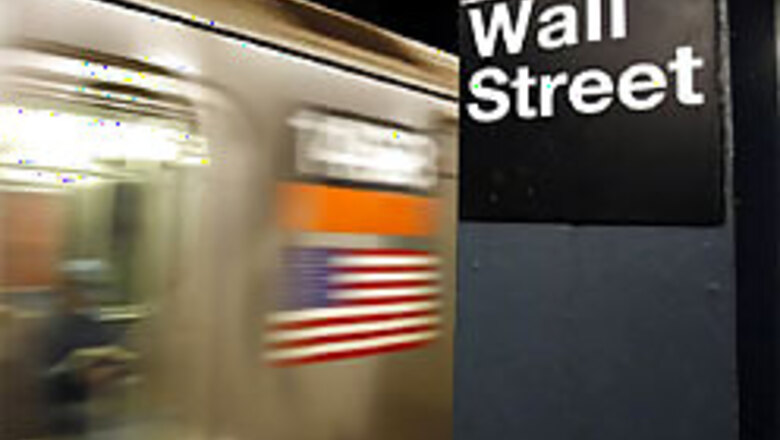
views
Washington/New York: Finance chiefs of the world's rich nations pledged on Friday to prevent big banks from collapse and to work together to stem the financial crisis after another day of gut-wrenching drops on world markets.
"The current situation calls for urgent and exceptional action," finance ministers and central bankers of the Group of Seven major industrialized nations said following their meeting in Washington. They pledged to use "all available tools," but did not announce specific measures.
Reeling from the loss of trillions of dollars of wealth, investors worldwide had pinned their hopes on decisive action from the G7. US stocks pared massive losses in a late recovery after a day of sharp moves.
And US Treasury Secretary Henry Paulson, warning that the United States was facing a prolonged period of uncertainty, said Washington was developing plans to purchase equity stakes in financial institutions.
Japan's finance minister also said that Japan was considering injecting capital into banks.
Such moves would be similar to measures that Britain has announced to put money into struggling banks. The G7, meanwhile, said it would work to get financing flowing.
"We commit to continue working together to stabilize financial markets and restore the flow of credit, to support global economic growth," officials of the G7, which includes the United States, Canada, Britain, France, Italy, Germany and Japan, said in a statement.
They said that would include using all available tools to prevent "systemically important" financial institutions from failure and to ensure that banks can raise capital from public and private sources.
The G7 stopped short of backing a British plan to guarantee lending between banks, something many on Wall Street saw as a vital step to end 14 months of turmoil and rising panic over recent weeks.
"The markets wanted maybe more assurance that there would be a unified global backstopping of the banks, and it doesn't sound like that's in there," said Kim Rupert, managing director of global fixed income analysis at Action Economics LLC in San Francisco.
"This week has been absolutely brutal. ... If this is the extent of it from G7, then we could be in for more trouble on Monday." Enrique Alvarez, head of Latin America debt strategy at Ideaglobal in New York, said he was disappointed.
"I think they had to come with a much stronger commitment in order to tackle the freeze in the credit market and the absolute lack of confidence in the G7 government leadership by the markets, equities in particular," he said.
Concerted interest-rate cuts by major central banks around the world, individual liquidity injections, and a $700 billion US bailout plan have so far failed to restore confidence. Leaders of euro zone countries will meet in Paris on Sunday in a new European attempt to coordinate action.
The Group of 20, which also includes reserve-rich emerging economies such as China and Russia, will meet on Saturday.
US stocks crawled back from massive losses in the final hour of trade, with the Dow closing down about 1.5 per cent on a day in which it traded in a 1,000-point range.
The eighth straight day of losses left the Dow down 18 per cent for the week. US stocks have lost $2.4 trillion this week and $8.4 trillion in the past year, according to the Dow Jones Wilshire 5000. The rally only partially resurrected the shares of Morgan Stanley and Goldman Sachs, pummeled when credit rating agency Moody's Investors Service said it might cut their ratings, reviving concerns about the viability of their banking models.
Both Morgan Stanley and Goldman Sachs last month converted to become bank holding companies. Asked about the two banks, Paulson said the G7 officials had not discussed specific institutions at their meeting.
Investors have been fretting that Mitsubishi UFJ Financial Group Inc, Japan's largest bank, could seek to renegotiate the terms of a planned $9 billion cash injection into Morgan Stanley.
Morgan Stanley's share price has fallen some 70 per cent over the last week and potential ratings cuts are looming, spurring many to make comparisons to Lehman Brothers Holdings Inc's final days. But analysts and a person close to Morgan Stanley said letting the bank fail was not really an option.
"You can't possibly allow Morgan Stanley to go. The unrelenting pessimism and absence of confidence that we've seen for the last two weeks would get worse," said Michael Holland, who oversees more than $4 billion of assets at Holland & Co LLC in New York.
Scrambling for safety, investors have pulled a net $43.3 billion from US mutual funds investing in equities so far in October, while pouring nearly $60 billion into money-market mutual funds. European shares had their worst week ever, with the pan-European FTSEuroFirst 300 index down 22 per cent in the week after closing down 7.6 per cent. The FTSEurofirst 300 closed at 851.23 points, its lowest close since July 2, 2003.




















Comments
0 comment